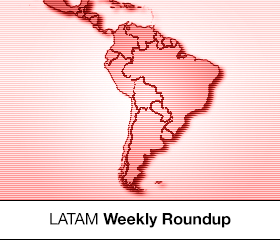Biggest Media Company in Brazil Starts Programmatic Trading; Publicis Group Gets Another Contract For the Digital Branch
by on 17th Aug 2015 in News


In this week’s LATAM RoundUp we cover the launch of ProG, Globo.com’s private marketplace; AG2 Nurun, digital native agency, Publicis Group, tells about their newest client; and Edmardo Galli, IgnitionOne, LATAM, talks about how the digital market behaves in Brazil, where the economic growth is not as fast as it used to be.
ProG: Globo.com’s private marketplace
Last week was marked by the announcement of ProG — the private marketplace of Globo.com. The publish is part of Organizações Globo, biggest media and broadcasting company in Brazil, and therefore represents a significant move in the Latin American market.
In an exclusive interview with Paris Neto, Technology Platforms Director, Digital Media Division at Globo, he talks in depth about the platform for ExchangeWire Brasil.
 ProG is operated by Rubicon Project and initially will be available for Globo.com’s 30 biggest advertisers. “Our step into media automation happened after two years of research and studies about it, both nationally and internationally. We launched ProG after being sure that we are offering a product that differentiates itself in the market with the security of our platform, transparency to advertisers and aligned to the Globo’s Commercial Practices Guidelines, ensuring the compliance with CENP’s standards [that regulates the media market in Brazil]”, Neto said.
ProG is operated by Rubicon Project and initially will be available for Globo.com’s 30 biggest advertisers. “Our step into media automation happened after two years of research and studies about it, both nationally and internationally. We launched ProG after being sure that we are offering a product that differentiates itself in the market with the security of our platform, transparency to advertisers and aligned to the Globo’s Commercial Practices Guidelines, ensuring the compliance with CENP’s standards [that regulates the media market in Brazil]”, Neto said.
According to Paris, ProG happened alongside with an evolution of the digital market in the country — in terms of technology and also the understanding about the potential of it. “If, following those guidelines, we can help to develop the market and reach maturity, we will be even more satisfied with the product that we are making available”, Neto said.
The choice of making ProG available for a exclusive group of 30 advertisers is a strategy that aims offering to the main partners and clients an exclusive experience, so they can include ProG in their planning. After the initial stage, the private marketplace will be open to other agencies and advertisers.
“It is important to emphasise that we chose Rubicon as a player to connect us to the DSPs, but all the inventory and trading will be done by Globo. Only Globo can sell Globo’s content — agencies and advertisers will keep dealing directly with our commercial team, keeping a safe, transparent and direct relationship”, pointed out Neto.
He also talked about gaps in programmatic trading, like advertisers that aren’t identified, or even the ones that do not get accurate information about prices in auctions or spaces where their pieces are displayed. “Not only is the initial price list public, the advertiser can also access the final price of actions”, he concluded.
AG2 Nurun conquers Habib’s digital account
In a competition involving other three agencies, AG2 Nurun, Publicis Group’s digital native agency, won Habib’s digital account — in addition to the conventional advertising contract, which already belongs to Publicis Brazil. The client is one of the biggest fast food chains in Brazil.
The strongest feature of the plan suggested by AG2 Nurun was a new development of Habib’s online delivery services. Although the companies didn’t disclose what was presented, the work starts immediately and should upgrade the platform to the market best practices.
According to an official statement, the portal should suffer major changes in the concept and actions so they can be up to date to the latest digital strategies.
Economic downturn in Latin America? Not in the digital market...
In his debut as a monthly contributor for ExchangeWire Brasil, Edmardo Galli, LATAM general manager, Ignition One, provokes a debate about the economic downturn in Brazil, which has gained some media attention across the world.
 He highlights that some sectors in the economy have not felt anything. Digital marketing is one of them: with IgnitionOne, operations keep running fine. The positive results follows the trend of digital companies when the economy does not grow as expected — mirroring what has happened recently in the United States and Europe, where digital goes against the grain with recent crisis.
He highlights that some sectors in the economy have not felt anything. Digital marketing is one of them: with IgnitionOne, operations keep running fine. The positive results follows the trend of digital companies when the economy does not grow as expected — mirroring what has happened recently in the United States and Europe, where digital goes against the grain with recent crisis.
Even in a smaller universe, Brazil repeats this behaviour. Digital spend in 2014 summed BRL 8.3bn (roughly £1.52m). This represented an 15% increase comparing to the previous year — and Brazil is more than half of the Latin American Market, more than three times bigger than Mexico, that follows in the second position.
Digital has proven to be cheaper and effective, especially in comparison to TV, which is strong in the Brazilian market. His piece can be read here (in Portuguese).








Follow ExchangeWire